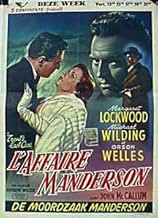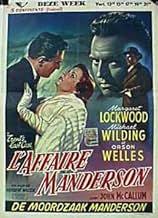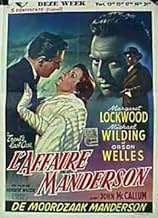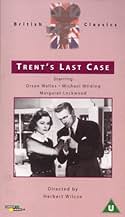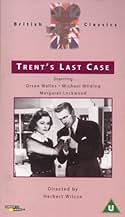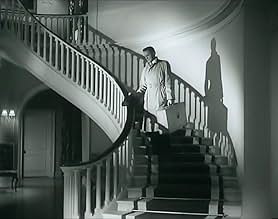Agrega una trama en tu idiomaA reporter investigates a rich businessman's death. While police rule it suicide, Trent believes it's murder and grows intrigued by the widow and secretary.A reporter investigates a rich businessman's death. While police rule it suicide, Trent believes it's murder and grows intrigued by the widow and secretary.A reporter investigates a rich businessman's death. While police rule it suicide, Trent believes it's murder and grows intrigued by the widow and secretary.
- Dirección
- Guionistas
- Elenco
Geoffrey Bayldon
- Reporter in Court
- (sin créditos)
Ernest Blyth
- Concert Attendee
- (sin créditos)
Robert Cawdron
- Police Constable
- (sin créditos)
John Chandos
- Tim O'Reilly
- (sin créditos)
Anthony Collins
- Conductor
- (sin créditos)
Henry Edwards
- Coroner
- (sin créditos)
Eileen Joyce
- Pianist
- (sin créditos)
Ben Williams
- Jimmy - Reporter
- (sin créditos)
Kenneth Williams
- Horace Evans
- (sin créditos)
- Dirección
- Guionistas
- Todo el elenco y el equipo
- Producción, taquilla y más en IMDbPro
Opiniones destacadas
I was pleasantly surprised by this film. I fail to understand why so many people have criticized it. I thought the entire peace of work was brilliant! Orson Welles gives a stirring and chilling performance as an insane cynical business man. I especially loved the fact that his presence remains quite strong through out the entirety of the film. The story reeks of the talent of Orson Welles. I am surprised that he did not direct the peace himself. We follow the story of a young new reporter looking for the story of a life time. He finds such a story within the home of a black widow, brilliantly played by Margret Lockwood. As i have stated many times, Margret Lockwood never ceases to amaze me with her subtle, but layered performances. She manages here to evoke a certain dismalness that cannot go unnoticed. She plays a rather mellow and unfeeling part. Frankly, her character is really not all that interesting. Margret plays her part well, but the part is very limited. The main focus is the character of Trent, a savvy and sly man who will stop it nothing to find the truth. This film is a classic murder mystery, produced in a citizen Kane manner. The flash back sequences are very well crafted, as well the plot and story structure. The other characters are also quite interesting. The character of Marlow is perhaps the victim of this tale and probably the most sympathetic of all characters. However,the ending is rather cliché and slightly destroys the tone of the film. I do recommend this film though on so many levels. If you want a good mystery story, as well as some good acting, then sit back and enjoy!
It's good news for Welles completists that this, the better of the two films he made for Herbert Wilcox in 1952 (to help finance his on-off-on but finally magnificent film of 'Othello') is now available on DVD, though dismally free of extras. As a thriller it is a puzzle almost devoid of suspense, though there are some clever twists at the end. There are polished performances by Margaret Lockwood, John McCallum, Michael Wilding as the classy sleuth Trent, Miles Malleson in one of his best roles and Welles. Welles appears for no more than 20 minutes, in flashback, but, with his formidable false nose, is an intimidating presence as the late Sigsbee Manderson. In a fraught dialogue with McCallum he talks about 'Othello' and the production he's recently seen: "Didn't like the leading actor!" The leading actor was Welles himself, performing at the St James' theatre - a performance I was privileged have seen a year or two earlier, when Ken Tynan, long before PC was thought of, headed his review 'Citizen Coon'!
Unlike the other reviewers above, I enjoyed this film immensely, probably because I am a Margaret Lockwood fan and collect as many of her films as I can when they are available.This one is not commercially available but I managed to find a dealer on Ebay who specialises in the older films I like.The other reviewers mention it is too "talky" but this is not supposed to be "Die Hard" or even a James Bond adventure.It is a cultured British film, from Republic films, from 1952 with an excellent cast who speak with wonderful diction and enunciation before "kitchen sink drama" mesmerised film producers.Herbert Wilcox (Anna Neagle's husband) produced this gripping thriller that keeps you guessing right up to the very end.I will concede that the plot is at times a bit like an amateur dramatic society but this gives it its intrinsic charm especially when the principal parts are played by good professional actors.An example is Orson Wells sitting in an armchair and filmed from the rear redolent of a James Bond villain.He only needed to be stroking a white cat on his lap!! Michael Wilding plays his usual debonair self as "Philip Trent" the artistic crime reporter.Margaret Lockwood plays again the pianoforte (see my critique of "Love Story" (1944) when she played Lissa Campbell),This time we have the pleasure of listening to Eileen Joyce (the real pianist) playing the famous Mozart piano concerto no:24 in C minor, larghetto movement.Eileen's other famous film credit was playing the Rachmaninov 2nd piano concerto in C minor for "Brief Encounter (1945).Orson as mentioned was fond of Shakespeare's "Othello" and some of this plot is worked into this film.Like "The Third Man" (1949), Orson does not appear until late into the film but he immediately makes his not inconsiderable presence felt as "Sigsbee Manderson".Margaret plays Margaret Manderson his wife.No trouble remembering her name by the cast!John McCallum gives a workmanlike performance as John Marlowe, the secretary to Manderson and Miles Malleson for once leaves aside his clerical garb to play Burton Cupples, Margaret's uncle.What amused me was seeing a very young Kenneth Williams playing a garrulous Welsh gardener! You would only see this film if you you actively set out to acquire it since it never appears on the the TV and as I said is not commercially available.Obviously being a thriller I will not divulge the plot.Suffice to say it ends happily for all concerned.I rated it 8/10. Since I wrote this critique in July 2007 this title is now commercially available from www.silversirens.co.uk Enjoy!
Agatha Christie considered this intrigue one of the best ever written, and it certainly is. The mystery is deep here, and as it gradually is unravelled you are in for any number of surprises. The actors are outstanding, with Michael Wilding as the detective intruding on the private lives of the young widow Margaret Lockwood and the man who loves her, who is the prime suspect, while Orson Welles as the victim provides an impressing finale as he enters in the final flashback. Miles Malleson plays an important part as a reluctant participant in the plot, while the story is what really matters. Herbert Wilcox' direction is faultless but very formal, giving the film a somewhat conventional character - there is no cinematography to speak of, while music plays an important part - Eileen Joyce has a moment as a performing pianist, and the film score is by Anthony Collins, who is also seen acting as a conductor - one of his rare appearances on film. After having reached the end of the story, and Michael Wilding closing his last case as Trent, yuo just have to agree with Agatha Christie about the marvellous windings of this plot.
MICHAEL WILDING is an armchair detective who sets out to determine whether or not the death of ORSON WELLES was suicide or murder. He thinks he's solved the case, only to learn that all is not what it appears (without giving the outcome away).
Unfortunately, the script is a dreary, talky and ponderous, making the film appear to be an amateurish stage play, although based on a novel. It's static. Nothing at all cinematic about the approach, nor is there any imagination in the directing.
Of all the players, MARGARET LOCKWOOD as the beautiful wife of the deceased man and JOHN McCALLUM as the man's secretary have key roles that they play with assurance. ORSON WELLES, with fake nose and bushy brows, might as well have been from another film. His ten or fifteen minutes of time on screen renders nothing but ham. Director Herbert Wilcox was evidently unable to tone him down and as a result his key scenes throw the film off stride. MICHAEL WILDING has a colorless role as the newspaper reporter who suspects foul play but can't prove anything.
With a talky script and lack of any cinematic touches, TRENT'S LAST CASE goes nowhere fast and leaves the viewer expecting a strong twist that never arrives--instead, a flat ending.
Production values are fine even though the film comes from the usually low-budget Republic studios.
Unfortunately, the script is a dreary, talky and ponderous, making the film appear to be an amateurish stage play, although based on a novel. It's static. Nothing at all cinematic about the approach, nor is there any imagination in the directing.
Of all the players, MARGARET LOCKWOOD as the beautiful wife of the deceased man and JOHN McCALLUM as the man's secretary have key roles that they play with assurance. ORSON WELLES, with fake nose and bushy brows, might as well have been from another film. His ten or fifteen minutes of time on screen renders nothing but ham. Director Herbert Wilcox was evidently unable to tone him down and as a result his key scenes throw the film off stride. MICHAEL WILDING has a colorless role as the newspaper reporter who suspects foul play but can't prove anything.
With a talky script and lack of any cinematic touches, TRENT'S LAST CASE goes nowhere fast and leaves the viewer expecting a strong twist that never arrives--instead, a flat ending.
Production values are fine even though the film comes from the usually low-budget Republic studios.
¿Sabías que…?
- TriviaIn the film, Sigsbee Manderson (played by Orson Welles) mentions a performance of Shakespeare's "Othello" at the St. James Theatre in London in 1951, in which he disliked the leading actor's performance. This is an in-joke: Welles himself played Othello at the St. James in 1951, under his own direction. Peter Finch played Iago opposite him.
- ErroresDuring the coroners inquest, Trent was seen drawing a sketch of Marlowe. This is not allowed in English Courts. Although court artists are allowed in as members of the public, all drawings must be done by memory outside the courtroom.
- Citas
Margaret Manderson: He talks of reopening the case.
John Marlowe: You should've ordered him out of the house.
Margaret Manderson: And confirm his suspicions?
- Bandas sonorasPiano Concerto in C Minor
Music by Wolfgang Amadeus Mozart (as Mozart)
Arranged and Conducted by Anthony Collins (uncredited)
Performed by Eileen Joyce
Selecciones populares
Inicia sesión para calificar y agrega a la lista de videos para obtener recomendaciones personalizadas
Detalles
- Fecha de lanzamiento
- País de origen
- Idioma
- También se conoce como
- Trentov poslednji slucaj
- Productora
- Ver más créditos de la compañía en IMDbPro
- Tiempo de ejecución
- 1h 30min(90 min)
- Color
- Relación de aspecto
- 1.37 : 1
Contribuir a esta página
Sugiere una edición o agrega el contenido que falta

